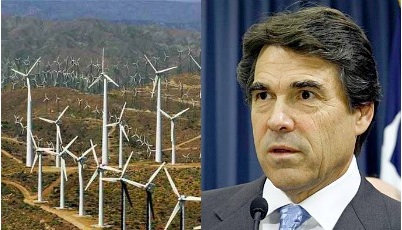Perry's Wind Energy Mandate

What would a President Perry mean for the U.S. energy-wise?
First, Perry's election would mean environmentalists might as well scrub "climate change" and "global warming" out of their vocabularies for four years. There would be no climate initiatives offered or accepted as such by a president who dismisses rising temperatures as the concoction of unnamed conspirators, even as his state bakes and burns.
Second, Perry's policy for oil development on public lands and offshore waters could be summed up as "come on down." Sportsmen and conservationists who support balancing oil production with other multiple uses, such as wildlife habitat conservation and watershed protection, would be in for four years of hand-to-hand legal combat with industry-cozy political appointees running the land management agencies.
Theodore Roosevelt would not be pleased. OPEC oil barons, however, would be mighty pleased at the U.S. perpetuating its dependence on the sauce. The faster we use up our resources, the prettier they sit on their giant reserves.
Third, Perry is a loyal subject of old King Coal. As governor, he tried to fast-track 11 coal-fired power plants, a plan that – like the giant Texas Transportation Corridor road-rail-pipeline land-grabbing megaproject – fizzled under its own weight. Under Perry, Texas has fought tooth and nail against EPA crackdowns on coal pollution, including a new rule aimed at protecting states downwind from the filth emanating from other states' exhaust pipes.
Look for a Perry EPA to bear little resemblance to the EPA of William Ruckelshaus or Bill Reilly.
A Perry administration, however, would not be all carbon-rich fuels, all the time. As governor, Perry has overseen a significant surge in gas production from the Barnett Shale and other shale gas formations, and would support the same nationwide.
Gas is the likeliest replacement for aged, dirty, inefficient coal plants that are prime candidates for retirement, regardless of what EPA does in the regulatory arena. As long as there is a long-term outlook for low gas prices, utilities will gravitate toward gas as a cheap, cleaner burning fuel that can replace the old coal clunkers and minimize future regulatory liabilities that could come down the pipe post-Perry.
As part of his all-of-the-above pitch, Perry has boasted about his state's incentives encouraging construction of energy-efficient new homes, efficiency retrofits, and upgrading of lighting and appliances. A Perry-approved state law in 2007 upped the portion of load growth that Texas utilities must meet through efficiency measures.
The American Council for an Energy-Efficient Economy, which publishes an annual scorecard rating state efficiency policies, ranks Texas as a fair to middlin' No. 32. Two states that were headed by Republican governors with a strong personal interest in critiquing Perry's record are ranked much higher, Massachusetts at No. 2, Utah at No. 12.
Perry also had a hand in the growth of Texas wind energy, one of the great renewable energy success stories of the past decade. In 2005, Perry signed into law a bill requiring Texas utilities to bring 5,880 megawatts of wind power on line by 2015, a goal that already has been achieved. One-fourth of the 42,432 megawatts of the wind capacity on line in the U.S. today is Texan.
To wheel energy from the gusty savannas of west Texas to urban load centers, Perry has backed aggressive transmission construction, paid for with monthly charges on customers' utility bills.
The likelihood of Perry supporting similar efficiency or renewables policies at the federal level, however, is doubtful, given his rhetoric about making the federal government "inconsequential" and leaving policy initiatives to the states.
Which about sums up the prospects for energy diversification under a Perry administration. Cutting the oil and coal portions in the U.S. energy diet would depend on gas staying cheap, nuclear getting cheaper, and on states taking the lead to push renewables. If any or all of those assumptions were to fall short of the mark, Perry's "all-of-the-above" pitch would turn out to be oil and coal above all.

